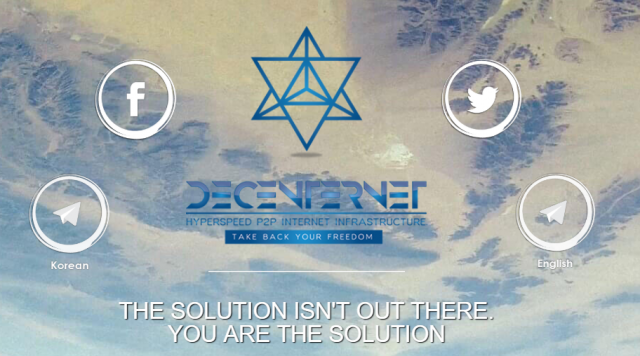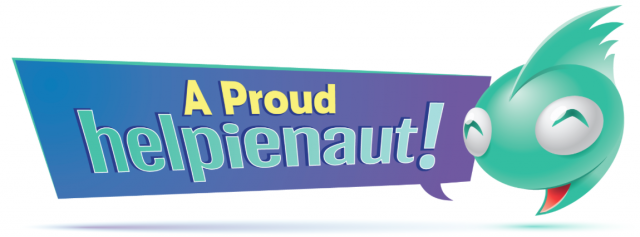
Screenshot of Decenternet's home page
I'm a firm believer that a claim must be judged not by the ideals which it represents, but by evidences that either support the claim or that punch it in the teeth. Pardon the graphics, but what I mean is this: If a man claims to be the tallest man in the world, then let's break out the measuring tape and see. If there is a record of any other man who makes that claim (and there is), then let's compare them. There is a clear standard to judge the claim. Absence of any ability to measure the height of a man, or of any previous record of men's measurements, would preclude us from judging the claim. It is with this thesis that I approach my analysis of Decenternet, an up-and-coming technology that makes some bold claims.
What is Decenternet?
First, I applaud Decenternet's website structure. Having built a few websites over the years (though I make no claim to be a web designer), I appreciate it when a company is thoughtful enough to make it easy for its visitors to evaluate what they're all about. In Decenternet's case, their home page is laid out with a problem/solution design that is easy to navigate (just scroll down).
Decenternet presents the problem this way:
The internet controls what people think, hear and feel. If that’s the case, who controls the internet? Monopolistic data distribution cartels physically own most the data you see on your screen enforcing their agendas on you. They have abusively amassed a massive wealth worth over $3 trillion US as of 2017, taking advantage of the data content you create.As someone who spends 10-14 hours a day online at least five days a week, I'm very aware of how content itself influences thought processes. I write much of that content. But the issue I have with this statement is its vague reference to "Monopolistic data distribution cartels." Since they don't spell it out, I'm left to guess who these cartels are. Typically, when people in the U.S. speak in such terms--often arriving there from a cyberpunk ethos--they mean the famed GAFA, an acronym that stands for Google, Apple, Facebook, and Amazon.
According to Inc.com, the top five technology companies, GAFA plus Microsoft, have a total net worth of $3.5 trillion. Maybe these are companies Decenternet is talking about. But are they abusive?
One could argue that these companies overstep their bounds in some ways. After all, one of the ways they earn revenues is by collecting data and selling it. But much of that data is handed over voluntarily by consumers. Don't believe me? Read the terms of service agreements you signed when you set up your Facebook, Amazon, and Google accounts.
Now, I'm not saying that I agree with every policy of these companies. I'm not a big fan of Facebook, though I do have a Facebook account, I detest Microsoft even though the laptop I'm writing this post on is equipped with Windows 10, and I refuse to buy Apple's overpriced products. I love Amazon, and if it weren't for Google, I might not have any clients.
Rather than argue against Decenternet's claims, however, let me just say that I wish they would simply spell them out more clearly. Who are they talking about, specifically, and what are these supposed "abuses?" They don't say.
However, they do offer a solution to this "problem."
The Decenternet(a.k.a. Dnet) is an alternative P2P permanent hyperspeed neutral decentralized internet infrastructure platform solution unbound by politics and oppression. Once Dnet is out, it can’t be stopped from spreading. It is cheaper, much faster, proliferates net neutrality, protects your privacy and removes the influence of corrupt intermediaries without having to ask for permission from any central organization.
Now that's a mouthful! Let's see if we can break it down.
Besides the overuse of adjectives, there is an inherent middle finger aimed at "corrupt intermediaries," seeming to imply that all intermediaries are corrupt. No doubt, this kind of language will appeal to the cyberpunks, but it will hardly win friends among those intermediaries that could become allies in the fight against centralization. I'd recommend toning that down a bit. Outside of that, a close look at the adjectives reveals other issues.
The word "alternative" is obviously intended to bolster value in the eyes of Dnet's target audience. It doesn't add value, in my mind. Bing is an alternative to Google, but I don't use it much.
"P2P" adds much more value. Peer-to-peer, or person-to-person, signifies that I don't need Google. Or an ISP, for that matter. If the Internet truly were P2P, it would look quite different than our 28-year-old World Wide Web. For all the good the Internet has done, and is, one thing it isn't is P2P.
If I understand this at all, I can hardly wait to rid myself of an ISP. In an effort to maintain net neutrality, the Federal Communications Commission declared the Internet a public utility, an idea which I think is ridiculous. Anyone who wants to combat centralization should start with federal regulatory bodies.
"Permanent" is another word that doesn't mean much to me. Could they mean "immutable?" As far as I can tell, content on the Internet is "permanent." Yes, you can delete a web page, but you can't delete its archive, and information that flows through multiple servers will be quite difficult to retrieve. Nevertheless, an Internet with the quality of immutability, because it is based on a blockchain, means it cannot be changed, which certainly is not the case with content on today's Internet.
"Hyperspeed" and "neutral" are two other adjectives thrown in for good measure. I like hyperspeed. That tells me the idea is to create an Internet that is faster than the one I have now. As much as I like using Chrome, it can at times slow to an annoying pace depending on how many tabs I have open, apps loading and unloading, etc. "Neutral," on the other hand, seems like another useless adjective. It seems to be politically charged, but I'm not convinced that Google and Facebook are pushing political agendas through their platforms.
The real meat of Dnet's "solution," in my estimation, is the idea of a "decentralized internet infrastructure," and, I have to say, I really like that idea.
One could argue that one of the qualities of the current Internet initially was decentralization. However, once corporations learned they could benefit from the same tools their smaller, more nimble counterparts enjoyed, the big land grab took over. I remember when Google was an upstart that couldn't get funding. Now, it practically determines what content you see based on its own secret and proprietary algorithms. I find Facebook's content algorithms even more perplexing. And let's not talk about retargeting, a brilliant idea that is quite annoying in practice.
Suffice it to say, I love the idea of a decentralized internet infrastructure, but is the idea to completely replace the current infrastructure, and, if so, how? As admirable as the idea seems, I'm not sure how practical it is. Primarily because it's never been done before. Therefore, what do I have to compare it to other than an Internet that, though it does have its issues, does seem to work quite well?
Idealism Vs. Reality In Decentralization
I have nothing against Decenternet's ideals. I adhere to many of them myself.
I like the idea of waking up in the morning and sitting at my laptop, which has been mining a cryptocurrency called Spyce all night, powering up my open-source and secure blockchain-based browser (Osiris), and searching for information on the decentralized search engine, mockingly called Liberty, and finding information I want instead of the information someone paid for me to find. And I like the idea of browsing the Internet without being bombarded by web-based advertising and fighting cookies all day. I also like the idea of driving without a drivers license, but I'm really thankful for that centralized database that is useful in creating safer public roadways despite the inconvenience.
I'm not quite sure when centralization became the enemy. In the age of Bitcoin, it seems that every blockchain-based project goes out of its way to prove it is decentralized because centralization is so evil.
I must admit, it is very much 20th century, but it certainly isn't evil.
When I take my grandchildren to McDonald's, I like being able to order a Big Mac and know that it goes through a process that is well-defined and ends up in my hands all because there was an element of centralized planning that put it there. However, it would be nice to buy a car from another party just by sending 1,000 digital currency units from my phone to his and speeding off into the sunset with a big crypto grin on my face. So there is a place for centralization, as well as for decentralization.
I will say there is one big bright spot to Decenternet and the ideals that is espouses. The ARPANET Foundation has endorsed the project.
For readers not familiar with ARPANET, the acronym stands for Advanced Research Projects Agency Network. It was a U.S. Department of Defense initiative that served as a precursor to the current Internet. I find their endorsement of Decenternet encouraging because it illustrates that the project conforms to the original purpose and values of the ARPANET, and therefore the Internet, but also that Decenternet could be a natural evolution of the worldwide network. That remains to be seen, however.
Decenternet plans to go live with its mainnet and Spyce wallet in Q4 2020. The Osiris web browser, Liberty search engine, and Anuvys operating system are due out by Q4 2023. This timeline should give the company plenty of time to work out any bugs. But I am left wondering how they plan to entice people away from the current Internet, or will the decenteralized Net swallow up the current one?
There is still much to learn about Decenternet, and I am only scratching the surface. Going back to my original thesis, all I have to judge it by is its own ideals, and, frankly, that's not enough. I'd like to take it for a test drive to see if it lives up to those ideals, but for now, I will explore Decenternet a little more and get back to you in a few days with some more analysis. Today, put me in the delightfully hopeful-but-skeptical box.
To learn more about Decenternet on your own, check out their web properties and social media profiles:
- Check out Decenternet’s website
- Check out ANUVYS \
- Follow the Decenternet Facebook page
- Follow Decenternet on Twitter
- Join the Decenternet Telegram group
Learn More About Me

Review Me, Please

Feel free to browse some of my latest Steemit posts.
The backside 5:
- From Common Thief to Goblin Shaman - A Steem Monsters Character Card Fiction Story
- Breakfast Talk: The Sonnet You Can't Take Seriously
- Farmpunk Fiction: Altland's Gambit
- 5 Ways to Use Steemit for Content Marketing
- A Night at the Opera, What's In Your Wallet?
- Poetry Sunday: We All Sing America Now
- Poetry Sunday: The Ballad of The Crustacean King - A Steem Monsters Fiction Writing Contest Entry
- What the Frack is Weird Fiction?
- How Magic Was Born - A Steem Monsters Story


Animation By @zord189

created and used by veterans
with permission from @guiltyparties


Posted from my blog with SteemPress : http://tayloredcontent.com/decenternet-wants-to-make-centralization-a-dirty-word/
